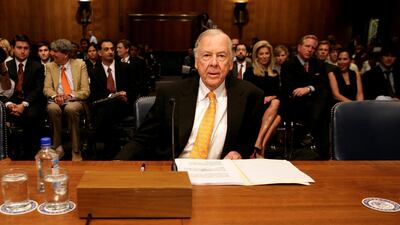The independent American oil man (indeed, almost always a man), immortalised in Dallas, seemed in the new millennium almost an extinct species. Thomas Boone Pickens – always known as T. Boone – died last Wednesday, aged 91. His life is a chronicle of twentieth-century petroleum, and a pointer to the future.
Pickens was borne in Holdenville in one of the quintessential oil states, Oklahoma, in 1928, the year after discovery of the Seminole field just 35 kilometres up the road had kicked off a boom there. Beginning as a geologist at $75 (Dh275) per day, he started his own oil company, Mesa Petroleum, in 1954, as others would do, such as former US president George H.W. Bush.
Mesa became one of America’s largest independent oil firms, but Pickens acquired his fame more through “drilling on Wall Street”. Following the early 1980s oil bust, he realised companies had become worth less than the value of their reserves. He was an early champion of “shareholder value”, making hostile runs at corporations with sleepy management, such as Phillips Petroleum and Unocal. Chief executives hated his “greenmail”, and he rarely emerged owning the target, but usually profited handsomely from selling his initial stake when another acquirer stepped in.
His most notable raid was in 1984, on Gulf, the fifth biggest US oil firm, that had developed Kuwaiti oil from its earliest days. In a titanic takeover battle that drew in Arco and others, Gulf was eventually sold to Chevron, but Pickens and his partners made $760 million. In an echo of that deal, Chevron last year approached Anadarko, one of the largest remaining independents, but was outbid by Occidental Petroleum, whose colourful founder, Armand Hammer, had kicked off the Libyan oil industry. Now Carl Icahn, another activist investor who emerged in the 1980s, has put pressure on Occidental for allegedly overpaying.
Mesa went overseas and discovered the large Beatrice field, named after Pickens’ second wife, in the UK North Sea in 1975. But by the 1990s, after major US fields seemed played out, attention turned to deep-water drilling in the Gulf of Mexico, and to the Caspian and Middle East, where deep-pocketed majors such as Shell, Chevron and BP dominated. Pickens sold Mesa in 1996; it became Pioneer Natural Resources. But in the second decade of the twenty-first century, he was suddenly not such a dinosaur.
The US shale boom created another series of colourful entrepreneurs. George Mitchell, who died in 2013, was the pioneer of hydraulic fracturing to release gas and oil from shale reservoirs that had previously been ignored. Aubrey McClendon, founder of gas driller Chesapeake, connoisseur of wine, antique maps and boats, was killed in a car-crash in 2016, after a series of near-ruinous financial and legal episodes interspersed by dramatic recoveries.
The politically outspoken Harold Hamm, promoter of the Bakken formation in North Dakota, with a fortune of some $14 billion, Scott Sheffield of Pioneer, the pipeline magnate Rich Kinder, and Cairo-born Lebanese Cherif Souki, initiator of US liquefied natural gas exports, are still with us. Ray Irani, whose strong relations in Abu Dhabi built Occidental into a major Middle Eastern player, stepped down as chief executive in 2010. The role is now held by Vicki Hollub, a rare woman in a top oil role, and also one of the US petroleum industry’s few strong advocates of climate action.
Pickens dabbled in the shale boom, picking up mineral rights on his own ranch near Amarillo in Texas. But his main activity after Mesa was running a hedge fund, BP Capital Management, which bet successfully on rising oil and gas prices, and again made him more money than drilling had done.
Then he poured cash into promoting US “energy independence”, encouraging natural gas as a vehicle fuel, and trying to build the world’s biggest wind farm in Texas. But the oil king was dethroned by the shale upstarts – the 2008 financial crisis, then the crash in commodity prices, caused his hedge fund to lose $2bn, and undermined the economics of his wind plans. Now that wind power is booming, he liked to comment that he was not wrong, just early.
Pickens also gave away much of his fortune to political causes – like most other oilmen, a Republican who backed George W. Bush and later Donald Trump – and philanthropy. In 2016, he suffered a number of strokes, and closed BP Capital Management at the start of last year.
Will there be more such self-made oil tycoons? It seems doubtful. The shale business is maturing and the hectic ways of the independent firms are giving way to the more cautious super-major firms. Exploration in far-flung regions is hard to finance. As climate change worsens, attention shifts from the scarcity of hydrocarbon resources to their over-abundance. Yet as mainstream investors fall out of love with the sector, drilling on Wall Street could still be profitable for those with an eye for a bargain.
Fortunes will be made in alternative energy, but not by capturing the resource – wind, waves and sun are abundant. Finding the minerals to power the energy transformation – such as lithium, cobalt, graphite and rare earths – still appeals to geologists hoping to strike it lucky. But most entrepreneurs of renewable power, batteries, carbon capture and other innovations will instead master new technologies, build dominant networks or “disrupt” incumbent business models as Pickens’ corporate raiding did. He successfully reinvented himself at least three times in his long career; now the oil industry will have to do the same.
Robin M. Mills is CEO of Qamar Energy, and author of The Myth of the Oil Crisis


